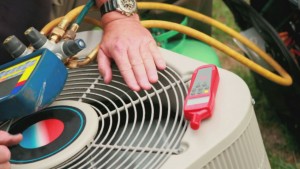What to Do if You Smell a Gas Leak
Oil heating systems carry many benefits for homes and businesses, including that oil burning units are cost-effective, highly efficient and safe. As a New Jersey homeowner or small business owner, however, it is important to be aware of the potential risks involved with any heating or cooling system. If you smell oil, see a crack in the heat exchanger, or find a soot-covered wall near the unit, for example, these are signs that your system needs maintenance. The risks of carbon monoxide are much lower in an oil-heated home than one heated with a gas furnace, but smelling a gas leak is a sign of danger and should be taken seriously.
Keep reading to discover how gas leaks can occur in oil heating systems and how you should react if you suspect a leak:
Do Oil-Heating Systems Produce Carbon Monoxide?
Carbon monoxide (CO) is produced by a wide variety of combustion processes like when fuels such as oil, natural gas, and propane are not completely burned off. This means that, in small amounts, carbon monoxide is a by-product of automobiles, clothes dryers, lawn mowers, and heating systems. As a gas, carbon monoxide is naturally odorless and tasteless. It is toxic to humans, which is why gas leaks are so dangerous. Furnaces are more prone to gas leaks, but carbon monoxide leaks can occur with oil heating units as well. If your heat exchanger is cracked or vents are blocked, CO may be forced back into the home via contaminated air.
 Preventative Maintenance
Preventative Maintenance
The best way to avoid gas leaks is by having your HVAC system regularly inspected and serviced. Technicians can help identify and repair potential problems before they lead to larger issues and protect your family from the risks of CO poisoning. Since carbon monoxide is naturally odorless, gas supply companies give it a foul-smelling, easily recognizable odor. In addition, carbon monoxide detectors are inexpensive and will immediately alert you of any danger.
When to Seek Help
If you smell a gas leak or your carbon monoxide detector begins beeping, do not hesitate to call for help. In the case of an emergency, alert your family and get out of the house. If you or any family members experience signs of CO poisoning, such as headaches, nausea, dizziness, or vomiting, call 911 and do not re-enter the home. If you have smelled a leak for the first time, but no one is showing any symptoms, you can turn off any fuel-burning appliances or units, ventilate your home, and then reset the detectors. If the detectors go off again, call 911 or your local fire department.
After turning off the fuel-burning units and ventilating your home, call a qualified technician to inspect the unit and repair any problems-do not attempt to service any fuel-burning appliances yourself. Point Bay Fuel offers 24/7 emergency maintenance for any oil heating or HVAC-related issues.
